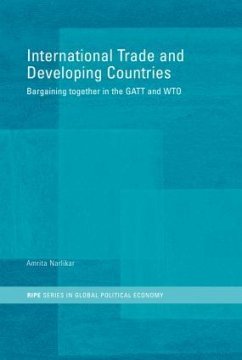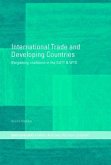This book provides a much-needed study of the bargaining coalitions of developing countries in the GATT and WTO. It traces, explains and theorizes on the formation and achievements of coalitions from 1982 to the present day. Bargaining together in groups is common practice in international negotiations and the limited bargaining power of developing countries makes coalitions an especially crucial instrument for their effective diplomacy. This book investigates the relevance and workability of coalitions as an instrument of bargaining power for the weak and analyses the coalition strategies of developing countries at inter-state level. The book focuses principally on coalitions involving developing countries and international trade. Through the case studies of the Uruguay Round and an analytical overview of more recent coalitions, the book fills a gap in the literature of international political economy and international relations.
Hinweis: Dieser Artikel kann nur an eine deutsche Lieferadresse ausgeliefert werden.
Hinweis: Dieser Artikel kann nur an eine deutsche Lieferadresse ausgeliefert werden.








